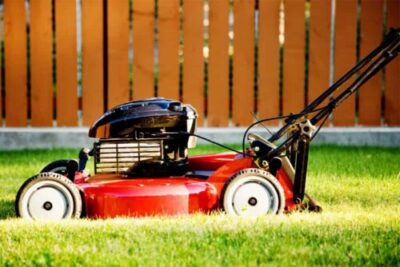Lawnmowers can get dirty pretty quickly. This is especially true when mowing wet grass, as it tends to clump together and become stuck to the plastic surface of your tools. A lot of people ask; can I hose off my lawnmower? Let’s discuss!
Disclosure: This article may contain affiliate links – that means we may receive a commission if you make a purchase after clicking on these links. This is at no extra cost to you.
Maintaining a clean mower is critical to ensuring that it runs efficiently for many years to come. A proper mower cleaning, on the other hand, needs the use of the proper tools for the task.
So, Can I Hose Off My Lawnmower?
Some people, depending on who you ask, do not suggest cleaning a lawnmower with a hose, especially ones that are fitted with electric motors. However, as long as proper precautions are taken, a hose is entirely safe to use on any type of lawnmower.
The most important thing to remember when using a hose on your lawnmower is to never spray the motor directly.
There are just parts of the mower that aren’t supposed to get wet or at least absorb a lot of water, especially on an electric mower. It is totally acceptable to use a hose on the rest of the mower.
After all, there may be a buildup of grass that need to be removed, and a hose is an excellent tool for providing maximum coverage.
Take the following precautions before cleaning your lawnmower:
- Allow the mower to cool before beginning to clean it. Getting water on a hot engine can cause engine damage. Of course, touching a hot engine can result in burns.
- Avoid getting water on the muffler, air filter, carburetor, and electrical components. Only the deck of the mower should be hosed down.
- There is a proper way to tilt your lawnmower. You should position the lawnmower so that the carburetor faces the sky. If you point the lawn mower’s carburetor toward the ground, it will fill with oil and make a sloppy mess. Please watch the video below to see how to appropriately tilt a lawnmower.
- If any grass remains after hosing down the undercarriage of your lawnmower, scrape it away using a mower deck scraper, wire brush, putty knife, or a similar instrument. Cleaning the underside of the deck on a regular basis will improve airflow and allow for better lawn mowing. It will also help to prevent rust and maybe increase the life of your mower.
What Happens If My Lawnmower Gets Wet?
The occasional splashing or light shower is unlikely to cause any long-lasting damage.
If your mower was left out in the rain for an extended amount of time, its internal components will suffer from water ingress, and fuel can be tainted.
Things You Can Do
In addition to removing the spark plug and filters, drain and dry the gas from the fuel tank and carburetor before adding fresh gas to the tank.
If you’re having trouble starting your mower, consider draining the gas and oil, as you want the mower to be entirely dry before running it again. A wet lawn mower is a lawnmower that does not work.
That being said, if your mower does get wet, don’t panic; it’s probably not irreparable.
Can I Use A Power Washer On My Lawnmower?
No, you should never use a power washer to clean your lawnmower.
While these are great pieces of equipment, perfect for washing deckings and driveways, they should stay as far away as possible from anything electrical- including your lawnmower.
The difficulty is that the pressure is so high that it drives water into bearings, cables, and behind seals, where it rusts and causes failure and loss of money.
The high-pressure water also washes away important assembly oil on axles, causing the dry components to wear out prematurely.
It is essential to remove the grass from the deck after each mow. Decaying grass emits acid, which will happily consume your mower in a matter of years.
The top of the mower deck can be cleaned, but a brush or leaf blower will suffice. If you’re still dead-set on using a pressure washer to clean your mower, then make sure that you never aim the hose at the motor directly.
Also, be sure to keep the pressure washer hose in motion as you clean, as constant pressure in one spot can wear away at the material very quickly.


